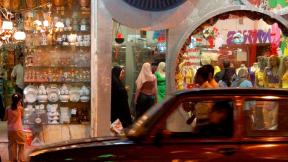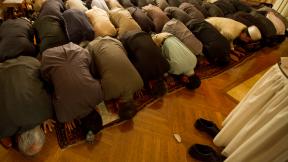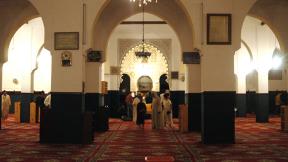
I met him at the train station in Ramadan. He was an acquaintance I had encountered at Muslim community events here and there, but I didn’t know him very well. This time though, he was drinking from a bottle in a brown bag. As soon as he saw me, he became a little angry.
“Why didn’t you tell me Ramadan was here, brother?” he asked, his voice accusatory.
I had no answer. But I did know that had this brother fasted, he would have gotten away from the other ills he was involved in, even if it was for one month. It was a mistake I promised myself I would never again make.
Not more than 10 to 15 percent of Muslims are connected to the mosque, and Islamic life in general, in the United States. That means that as announcements about the start and end of Ramadan, timings for Taraweeh prayers, and opportunities to give charity are made regularly within our Masjids, the majority of American Muslims don’t get this information. This comes under our Ramadan duites to inform and help them about.
And yes, there are Muslims who don’t fast, as well as those who don’t know how to pray.
While it’s easy to forget about these brothers and sisters and focus on our own spiritual development during the blessed month, this attitude ignores the fact that community is a critical part of Ramadan duties. And that means not only the limited number of people we may meet in the mosque for prayers or at the Iftar parties we attend. It includes those who, for whatever their reasons, have chosen to distance themselves from the Muslim community and its institutions.
But while we share the good news of Ramadan’s arrival and encourage fellow Muslims to gain its benefits, it’s crucial that we use wisdom and beautiful preaching. If Allah ordered Prophet Moses, peace be upon him, to approach Pharaoh in the most polite manner (Quran 20:44), then we have no excuse to be harsh and judgmental when sharing the beauty and brother/sisterhood of this blessed month.
Here are some ways we can share the news of Ramadan with others this year:
1. Scour your phonebook and email address list, then send a message
Call and/or email every person in your email list to wish them Ramadan Mubarak. For those who don’t frequent Islamic institutions, send a personalized message instead of a generic one, wishing they, their spouse, and every one of their children a blessed Ramadan.
2. Don’t be shy to approach someone in person
A brother I know once went to the home of a Muslim acquaintance to wish him a Ramadan Mubarak. When he didn’t find him there, he left a note on his door, saying he just wanted to let him know that Ramadan had begun.
After the blessed month had ended, the acquaintance contacted this brother and told him the past Ramadan had been the first one during which he had fasted since his arrival in the United States almost two decades earlier.
This small gesture to inform another Muslim about the blessed month reaped unexpected benefits for both the giver of good news and its receiver.
3. Host an Iftar party
A number of Muslims have stopped hosting or attending Iftar parties in Ramadan. They feel that since the month should be devoted to worshipping God, parties take away from that.
But one thing these gatherings are good for is bringing Muslims otherwise distant from the community together. They are a venue they not only enjoy, but crave, during the blessed month. If you host only one Iftar party this Ramadan, please do so for your family members or friends who normally don’t associate with Muslims or the Masjid.
Very often, people who don’t usually partake in Ramadan’s duties and rituals will, for example, fast if they have to go to an Iftar party to share in the experience with their hosts.
4. On campus: host a collective day of fasting
In a survey, the Institute for Social Policy Understanding found that 47 percent of Muslim students had consumed alcohol during the previous year.
It is likely that these students are also those who don’t fast. This is why Muslim Students’ Associations should organize a collective fast and Iftar at least one day of Ramadan. It will raise awareness among students about the blessed month and may even encourage those who drink and are involved in other vices to stop, at least during the month of fasting.
5. Don’t forget Facebook and Twitter
Make sure to update your status throughout Ramadan to share what you are doing. Beyond the first day of wishing everyone Ramadan Mubarak, you can include messages like (your name):
- is listening to awesome recitation of Surah al-Anfal during Taraweeh
- wishes he could give more money for (cause of choice) this Ramadan
- is feeling hungry but feeling for the panhandler on Michigan avenue four hours before Iftar
- is trying to eat that one-third of food for Iftar
- is trying to eat during Suhoor with her eyes open
The point is to share various aspects of Ramadan in a fun and personal way without sounding preachy.
You can do the same thing with text messages on your phone.
-------------------
Imam Abdul Malik Mujahid is the founding Chairman of Sound Vision Foundation, the leading producer of educational content on Islam and Muslims. He is also executive producer of the daily Radio Islam talk show on WCEV 1450 AM in Chicago.
Photo Attribution - Seier+Seier - http://www.flickr.com/photos/seier/1786608880/








Add new comment